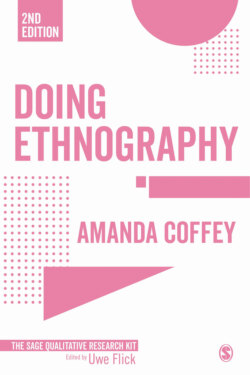Читать книгу Doing Ethnography - Amanda Coffey - Страница 15
На сайте Литреса книга снята с продажи.
Feminist ethnography
ОглавлениеLike qualitative research more generally, ethnography has also been shaped by, and has helped to define feminist scholarship and research practice. The dialogue between feminism and ethnography can be situated within feminist critiques of social science and social research more generally. There have been nuanced understandings of the ways in which the ideologies of gender have structured the social relations of research, alongside considerable philosophical debate about the gendered nature of knowledge (Harding, 1987; Ramazanoglu and Holland, 2002). Feminist theorists have critiqued some of the established assumptions that have underpinned social scientific inquiry, calling into question underlying perceived dichotomies – such as objectivity/subjectivity and rationality/emotionality – as well as repositioning and restating knowledge as grounded, local, partial and temporally situated. Such insights have led to a feminist research agenda and to a recasting of feminist social research – where the conditions of knowledge production are critically acknowledged and accounted for, where issues of power are recognized in the research process and in relation to research production, and where epistemology and ontology are central (Letherby, 2003). As Stanley has eloquently described, ‘feminism is not merely a perspective, a way of seeing; nor even this plus an epistemology, a way of knowing; it is also an ontology, a way of being in the world’ (1990, p. 14).
It is now widely accepted that feminist research methods can incorporate a wide variety of approaches, both quantitative and qualitative; as Letherby (2003) notes, feminists can count as well as quote. It is certainly not the case that some methods are more inherently feminist than others, and feminist scholars have used a variety of approaches to empirical work and knowledge creation. Within that general context, feminist researchers have used and developed ethnographic approaches to reveal women’s standpoints (Farrell, 1992; Langellier and Hall, 1989) and have debated the representation of feminist ethnography in and through the production of texts (Behar and Gordon, 1995; Clough, 1992). Feminist anthropologists, for example, have engaged in an epistemological and methodological project towards establishing a distinctive feminist ethnography (see Jennaway, 1990; Schrock, 2013; Walter, 1995). Abu-Lughod (1990) posed the question as to whether there can be a feminist ethnography, and if so what that might look like. This included a focus on the ways in which feminist ethnography might enable exploration of the relationship between feminism and reflexivity, troubling the distinction between objectivity and subjectivity, and considering the power in and of writing. Abu-Lughod spoke of an ‘unsettling of the boundaries that have been central to its identity as a discipline of the self-studying other’ (1990, p. 26). Jennaway similarly argued that postmodern discourses in ethnography borrowed from and emerged out of feminist preoccupations and articulations, including a move towards egalitarian relations of textual production, more dialogic and collaborative approaches and a ‘move away from systems of representation which objectify and silence the ethnographic other’ (1990, p. 171). Reflecting on the methodological imperatives of feminist ethnography in contemporary times, Schrock (2013) identifies the importance of representation (both its benefits and detriments) and ethical responsibility towards the communities where researchers work and study.
